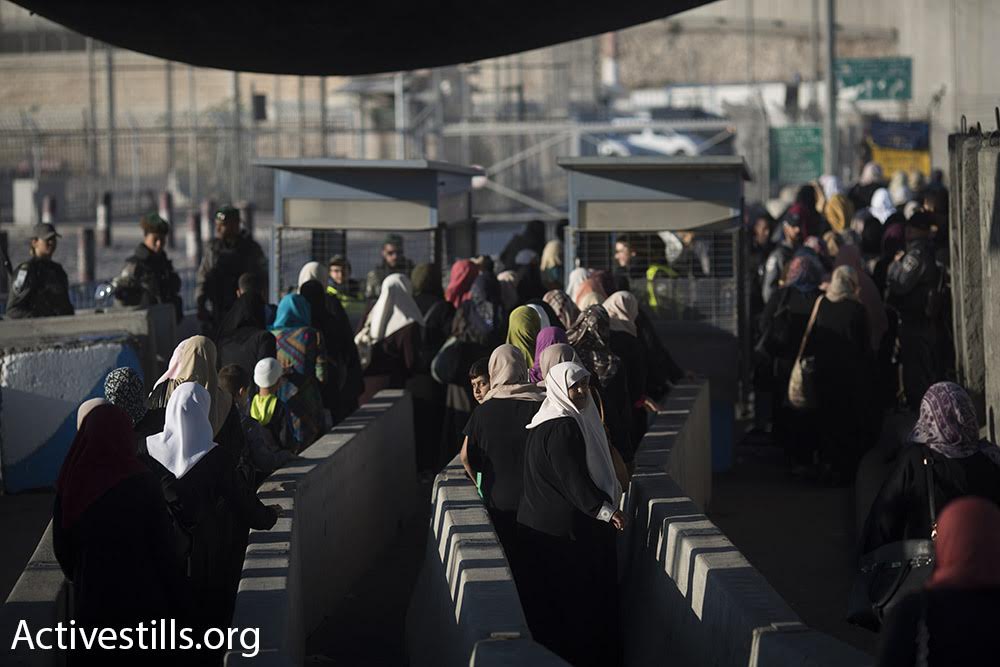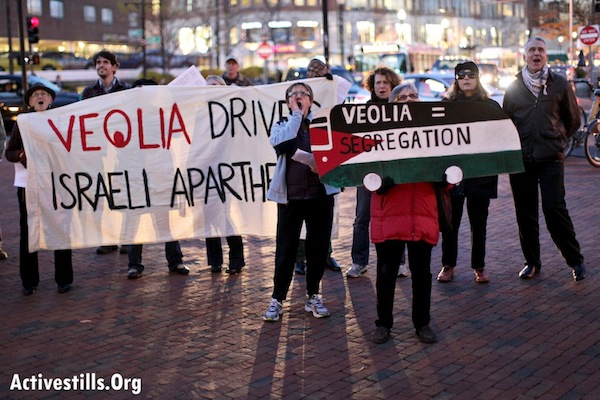The ‘coexistence model’ is outdated and misleading. Instead, a Palestinian and an Israeli activist talk about eliminating systems of oppression from the bottom up — together.
By Renad Uri and Omri Evron

As the dispossession of Palestine enters its eighth decade and Israel’s occupation of the Palestinian people its sixth, it is time to finally change the conversation.
Many summer camps and youth leagues promote a dialogue of coexistence on Israel-Palestine. This model is also adhered to in U.S. diplomacy regarding the conflict post-Oslo. The assumption that coexistence can solve deep-rooted issues is misleading, though. It creates a false sense of equality between Palestinians and Israelis, and minimizes the systemic power imbalance between an occupying state and an occupied people.
In recognizing this, it is important to set an alternative approach that can genuinely allow for Palestinians and Israelis to band together; one that rejects imperialism and discrimination in any of its forms for the interests of both people. We believe that our story, of a deep solidarity between an Israeli and a Palestinian who equally reject Israel’s military state and ethnic segregation, can serve as an example for a new approach – one of co-resistance.
Omri: I was raised in a progressive Jewish family in Jaffa. I had the privilege of growing up in a neighborhood shared by Muslims, Christians, and Jews, which is unfortunately a rare experience; despite Israel’s claim to be a multicultural country, ethnic segregation dominates our society.
As a teenager growing up during the Second Intifada, I became politically active in reaction to the apathy I saw among my own classmates, who were indifferent to the suffering of Palestinians being oppressed by the IDF every day, but also to the many Israelis who were being driven into poverty by neoliberal policies. I knew I had to take a stand against a system that treated Palestinians, as well as many disenfranchised Jews, with such callousness.
In 2005, I was one of the organizers of a letter signed by 250 high-school students declaring our refusal to serve in the Israeli army. Despite being imprisoned for this decision, I continued fighting for peace and justice in my community and country.
I could not do this alone, though – standing shoulder-to-shoulder with Palestinians struggling for liberation is what gave me the courage to speak out. These are the people who have most influenced my activism, worldview, and identity. I found common cause with Arab friends in the Communist Youth League of Israel, fighting together to dismantle the systems that I began to realize were not only oppressing them, but also me and my community. The first time I felt proud to be an Israeli Jew was when I marched alongside Palestinians protesting the apartheid wall in the West Bank village of Bil’in.

Renad: I am Palestinian-American, born and raised in Ramallah. Growing up in the West Bank, I was confined to 251 square miles dotted with military checkpoints, and a towering wall lined with snipers. Trying to grow, physically and mentally, while essentially trapped in an open-air prison was all-around exhausting. As Palestinians, we are subjected to military and institutional violence on a daily basis, but attending an international school endowed me with unique privileges.
Upon graduating high school, I was finally able to break through Israel’s barriers of segregation and occupation to attend college in the United States. There, traveling from state to state with ease, I began to fully understand what it meant to be oppressed and marginalized by a country that practices white-Jewish supremacy. It took me leaving my home, family, and friends to finally realize how we, Palestinians, have come to treat the occupation as if it were a normal part of our lives.
While in Palestine my activism was strictly limited to participating in protests, engaging in Palestine advocacy in the U.S. helped me discover the role I wanted to play in resisting Israel’s occupation. Over time, I began to learn about solidarity and collective actions that can work toward the liberation of my people. I learned this alongside powerful activists seeking justice for all marginalized communities.
I first met Omri during a week of Palestine awareness in Washington, D.C. After years of interacting with Israelis as soldiers and occupiers who controlled us, treating them as enemies became very conventional. He was the first Israeli I met who had rejected military service, which is compulsory for Jews and Druze in Israel. I suddenly learned that on the other side of the 25-foot apartheid wall that separates our communities, which live only 90 miles apart, there was someone who envisioned dismantling Israeli systems of violence and dependence on Western imperialism – just like me.
Working alongside pro-Palestine Israelis like Omri and American Jews has shown me a kind of solidarity I did not know existed. I now have countless coalitions, friends, and bonds with American Jews and who reject Israel’s actions and see natural allies in Palestinians like me.
For decades, we Palestinians have been invited to the table for photo ops and dinners – never for the agreement to retrieve land, dignity, or self-determination. The ongoing, dead-end, U.S.-sponsored “peace process” since Oslo has only made circumstances worse for Palestinians, especially Palestinian refugees. Time and time again, money is being pumped into the pockets of our “saviors” with no evidence that the work they do improves Palestinian lives.
This is why a “business-as-usual” environment is completely off the table, and clearing the Israeli conscience should no longer be part of the agenda. To combat all forms of racism in our communities, we must aim toward systematic change, not just dialogue. Co-resistance requires a commitment to ending the occupation, to the right of return, as well as constantly advocating for equal rights for all. It allows for constructive dialogue that is devoted to collective liberation. We do not waste our time on emotional dialogue that empties peace of its definition. Instead, we are focused on eliminating systems of oppression from the bottom up, predominantly Israel’s occupation of Palestinians, and the apartheid state it has transformed into.

Omri: Unlike many of the well-meaning projects that promote coexistence between Israelis and Palestinians, the kind of co-resistance that Renad and I advocate for is built on a shared struggle against powerful institutions and systems of violence. It is also distinguished from the philanthropic politics of progressive Jews that like to express one-sided solidarity with the Palestinians, which unintentionally reproduces the trope that paints people as either white saviors or black/brown victims.
Co-resistance forces both of us to recognize that our individual liberation is inseparable from that of others. While Palestinians overwhelmingly bear the brunt of the oppressive rule currently in place, everyone gets hurt. Being one of the highest per-capita military spenders in the world leaves Israel in a constant state of war and fear, even before factoring in the $38 billion that the U.S. spends on the Israeli military through private weapon corporations. At the same time, more than a third of Israeli children and 70 percent of Palestinian children live below the poverty line.
Co-resistance recognizes that even as a citizen of the occupying state, my best hope to change my country into a place that will truly be better for myself and my people is to fight alongside the Palestinians resisting my state’s oppression. This strategy allows me to demonstrate to the Israeli public that our real enemies are not the Palestinians, but the Israeli government and the wealthy ruling class that perpetuate a system of division and oppression. As an Israeli, standing in solidarity with the Palestinian struggle for justice and equal rights is the most effective path to peace and an egalitarian, democratic, and just society for all people in this land.
We, Renad and Omri, reject the notion that self-determination for the Jewish people comes at the expense of Palestinians, an idea most recently promoted by the Jewish Nation-State Law. Upholding Palestinian rights should not be perceived as a threat to Israelis, but a necessary condition for the better future of both of our people, and therefore it is a goal we must fight for together. We must organize as equals, alongside the other peoples of the Middle East.
Renad Uri is a recent graduate of the George Washington University. She specializes in Middle East policy, with a focus on Palestine and U.S. aid to Israel. In 2016, Renad became an active member with Students for Justice in Palestine and the Boycott, Divestment and Sanctions movement in the United States.
Omri Evron is an Israeli peace and social justice activist born in 1987 in Jaffa. In 2006 he was sent to an Israeli military prison as a conscientious objector, in protest of the occupation of the Palestinian people. Omri is an active member of the Communist Party of Israel and the Democratic Front for Peace and Equality (“Aljabha/Hadash”). He is currently writing his PhD in the Politics and Governance department at Ben Gurion University.
